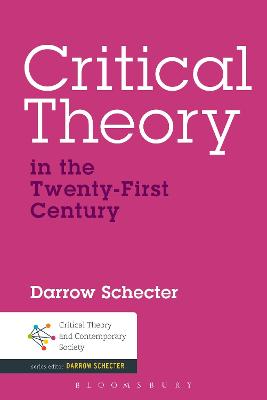Critical Theory and Contemporary Society
2 total works
Critical Theory in the Twenty-First Century provides a thorough overview of critical theory, looking at its history and shortfalls.
First, the book explains the developments from the Frankfurt School and from more recent schools of thought, including Derrida, Deleuze, deconstruction, and post-structuralism. Then it looks at how critical theory has not kept pace with the changes and conflicts brought on by the post-Cold War world and globalization and how its deficits can be addressed. For the author, more than ever critical theory needs to synthesize theoretical perspective and empirical research. It also needs to be reconfigured in the light of the demands of new social movements, post-colonialism, and globalization.
This volume is part of Critical Theory and Contemporary Society, a series that uses critical theory to explore contemporary society as a complex phenomenon and includes works on democracy, social movements, and terrorism. A unique resource, Critical Theory in the Twenty First Century will interest anyone researching issues in political theory, international relations theory, social theory, and critical theory.
First, the book explains the developments from the Frankfurt School and from more recent schools of thought, including Derrida, Deleuze, deconstruction, and post-structuralism. Then it looks at how critical theory has not kept pace with the changes and conflicts brought on by the post-Cold War world and globalization and how its deficits can be addressed. For the author, more than ever critical theory needs to synthesize theoretical perspective and empirical research. It also needs to be reconfigured in the light of the demands of new social movements, post-colonialism, and globalization.
This volume is part of Critical Theory and Contemporary Society, a series that uses critical theory to explore contemporary society as a complex phenomenon and includes works on democracy, social movements, and terrorism. A unique resource, Critical Theory in the Twenty First Century will interest anyone researching issues in political theory, international relations theory, social theory, and critical theory.
Democracy in the twenty-first century faces a number of major challenges, populism, neoliberalism and globalisation being three of the most prominent. This book examines such challenges by investigating how the conditions of democratic statehood have been altered at several key historical intervals since 1945. It demonstrates that the formal mechanisms of democratic statehood, such as elections, have always been complemented by civic, cultural, educational, socio-economic and constitutional institutions that mediate between citizens and state authority. Rearticulating critical theory with a contemporary focus, the book shows why a sociological approach is urgently needed to address conceptual deficits and explain how the formal mechanisms of democratic statehood need to be complemented and updated in new ways today.

